Welcome to the Wednesday, Nov. 26, Brew.
By: Briana Ryan
The Daily Brew will take a break for the Thanksgiving holiday. We’ll return to your inboxes on Dec. 1. Thanks for reading, and enjoy the holiday!
Here’s what’s in store for you as you start your day:
- Democrats defending 14 U.S. House districts Trump won in 2024, Republicans defending nine Harris won
- Republican Party committees maintain lead in fundraising over Democratic Party committees in October
- Mikie Sherrill’s resignation creates vacancy in New Jersey’s 11th Congressional District
Democrats defending 14 U.S. House districts Trump won in 2024, Republicans defending nine Harris won
In the 2026 U.S. House elections, 23 Congressional districts will have an incumbent from a different party than the presidential candidate who carried the district in 2024. Democrats represent 14 districts that Donald Trump (R) won in 2024, and Republicans represent nine districts that Kamala Harris (D) won.
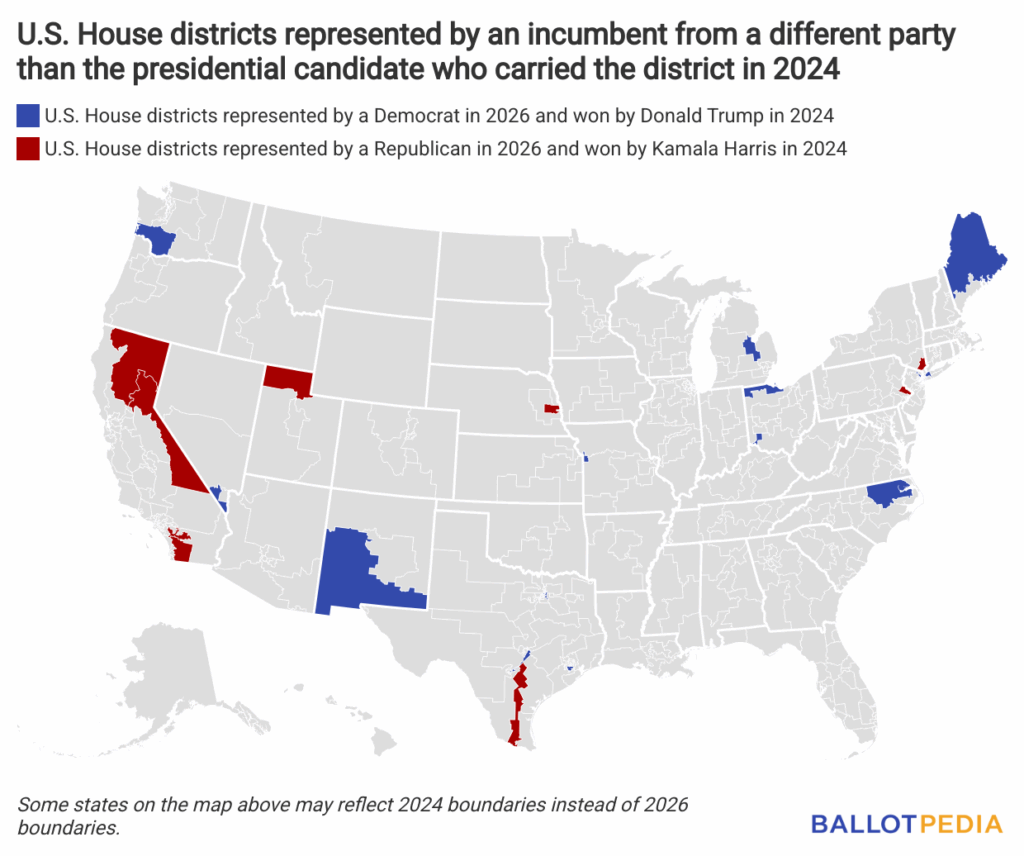
This is a reversal from 2024, when Republicans defended more districts that Joe Biden (D) won in 2020. Republicans held 19 such districts before the 2024 elections, while Democrats held eight districts Trump won in 2020.
Redistricting is responsible for more than half of these districts. Seven Democrats now represent more Republican-leaning districts in Missouri, North Carolina, Ohio, and Texas. Similarly, six Republicans now represent more Democratic-leaning districts in California, Texas, and Utah.
Trump's margin of victory (MOV) in the 14 Democratic-held districts ranged between 1.0 and 15.5 percentage points. Democratic MOVs in those 2024 U.S. House races ranged from 0.6 to 34.8 percentage points. One incumbent—Rep. Al Green (D-Texas)—ran unopposed.
So far, one incumbent Democrat in a district that Trump won in 2024—Jared Golden—announced that he will not run for re-election in 2026.
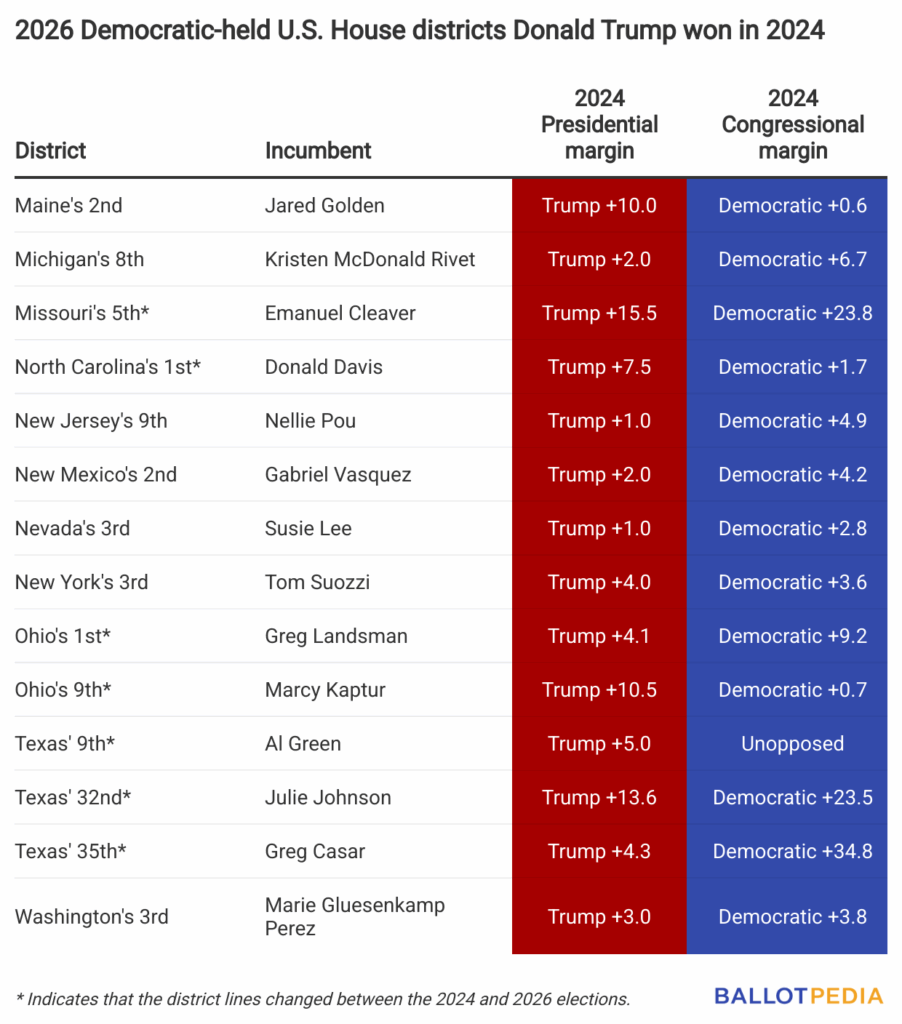
Harris' MOV in the nine districts ranged from 0.3 percentage points to 23.7 percentage points. Republican MOVs in those 2024 U.S. House races ranged from 1.8 to 31.0 percentage points.
So far, one incumbent Republican in a district that Harris won in 2024—Don Bacon—announced that he will not run for re-election in 2026.
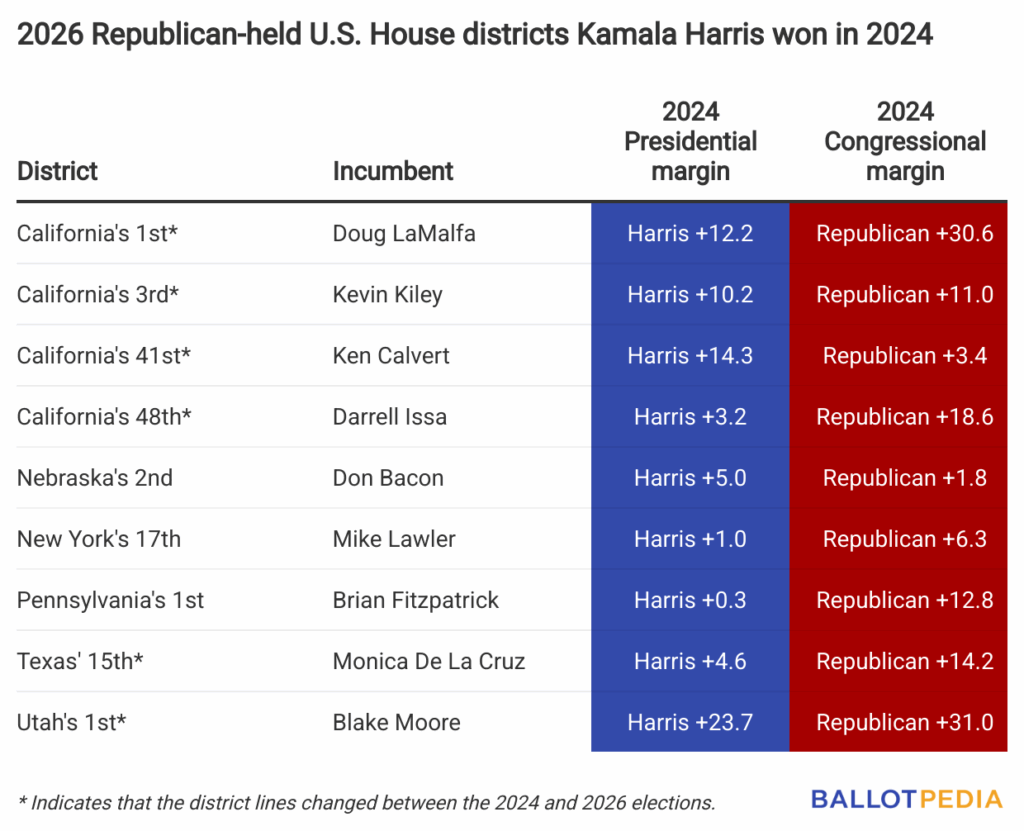
Click here for more about the U.S. House districts with Republican representatives in 2026 that Harris won in 2024, and here for more about the U.S. House districts with Democratic representatives in 2026 that Trump won in 2024.
Republican Party committees maintain lead in fundraising over Democratic Party committees in October
As of Oct. 31, the end of the most recent party committee campaign finance filing period, the three committees associated with the Democratic Party have raised a cumulative $289 million and spent $264 million in the 2026 election cycle, while the three committees associated with the Republican Party have raised $319 million and spent $219 million.
The three Democratic committees are the Democratic National Committee (DNC), the Democratic Senatorial Campaign Committee (DSCC), and the Democratic Congressional Campaign Committee (DCCC). The three Republican committees are the Republican National Committee (RNC), National Republican Senatorial Committee (NRSC), and National Republican Congressional Committee (NRCC).
The DCCC leads the NRCC in receipts, disbursements, and cash on hand. The RNC leads the DNC in cash on hand and receipts, while the DNC leads in disbursements. The NRSC leads the DSCC in receipts and disbursements, while the DSCC leads in cash on hand. See the table below for exact figures.
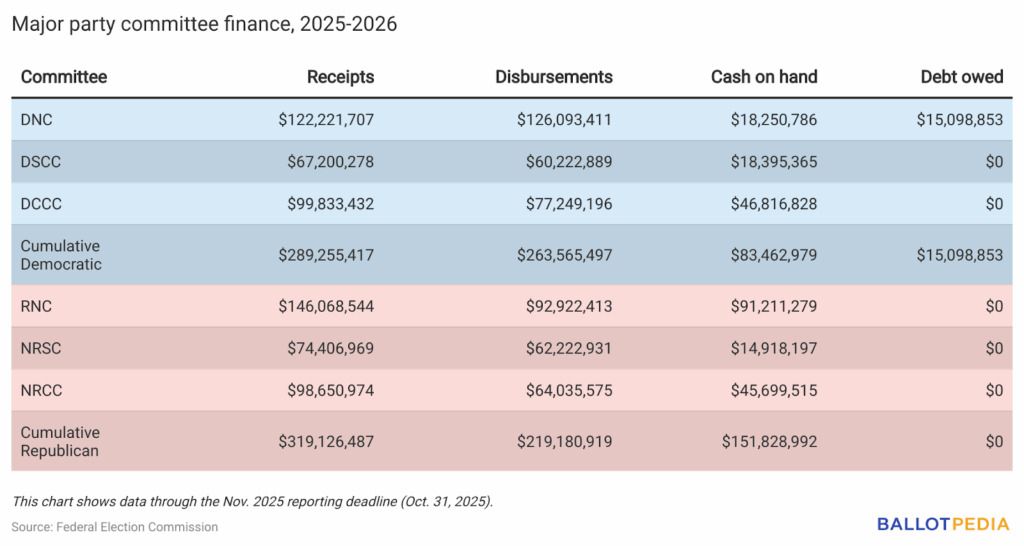
Compared to previous election cycles, the Democratic committees’ cumulative fundraising as of October ($289 million) is less than their receipts at this point in the 2022 election cycle ($325 million) and more than their receipts at this point in the 2024 election cycle ($255 million). On the Republican side, the three committees have raised $319 million, which is less than their October 2021 fundraising total ($338 million) and more than their October 2023 fundraising total ($211 million).
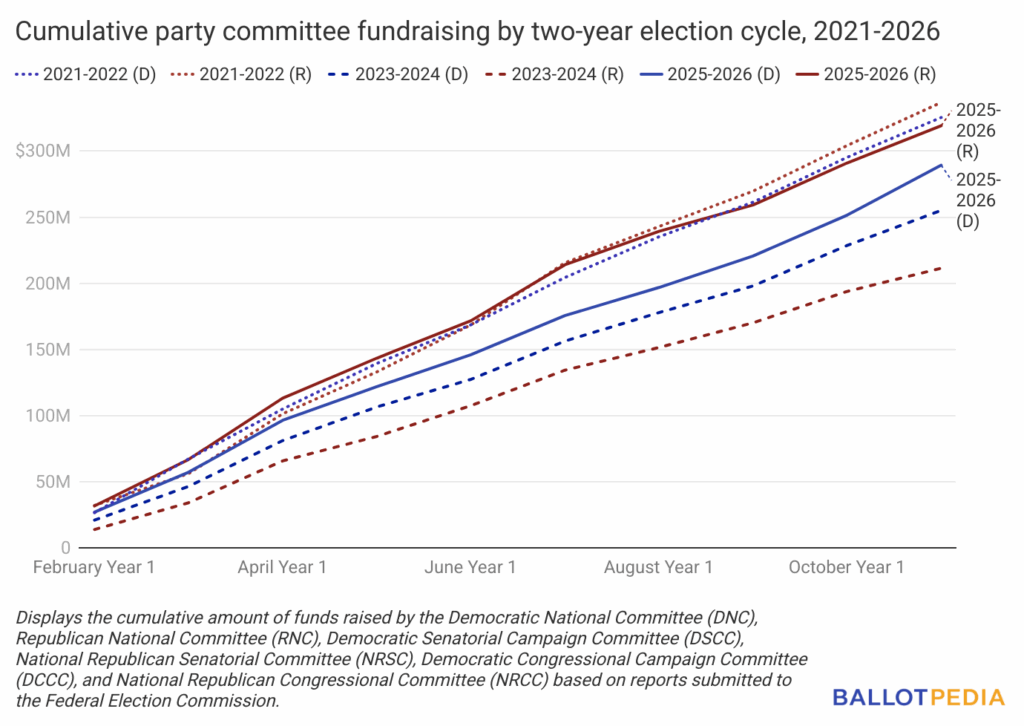
Click here to learn more about party committee fundraising.
Mikie Sherrill’s resignation creates vacancy in New Jersey’s 11th Congressional District
On Nov. 20, Mikie Sherrill (D) resigned from the U.S. House of Representatives to prepare to serve as governor of New Jersey, creating a vacancy in New Jersey’s 11th Congressional District. Sherrill takes office on Jan. 20, 2026.
New Jersey Gov. Phil Murphy (D) set the special election date for April 16, 2026. The primaries will be on Feb. 5, 2026.
The vacancy now brings the Republican majority in the chamber to 219 to 213, with three vacancies.
Sherrill’s resignation marks the sixth time since April 24, 2024, that there’s been a vacancy in New Jersey’s congressional delegation:
- New Jersey's 10th Congressional District was vacant for 152 days after Rep. Donald Payne Jr. (D-N.J.) died on April 24, 2024.
- New Jersey's 9th Congressional District was vacant for 135 days after Rep. Bill Pascrell (D-N.J.) died on Aug. 21, 2024.
- New Jersey's 3rd Congressional District was vacant for 26 days after then-Rep. Andrew Kim (D-N.J.) resigned Dec. 8, 2024, following his election to the U.S. Senate.
- One of New Jersey’s two U.S. Senate seats was vacant for 20 days after Sen. Bob Menendez Sr. (D-N.J.) resigned on Aug.16, 2024, after being convicted on 16 counts of federal corruption charges.
- The U.S. Senate seat became vacant again for approximately one day after Sen. George Helmy (D-N.J.) resigned on Dec. 8, 2024, allowing Kim to take office early.
Vacancies in the 119th Congress
So far in the 119th Congress, there have been seven House and three Senate vacancies:
- Two in the U.S. Senate were filled via appointment.
- One in the U.S. Senate was filled when Sen. Jim Justice (R-W.Va.) was sworn into office 11 days after the start of the 119th Congress. Justice delayed his swearing-in in order to fulfill the remainder of his term as governor of West Virginia.
- Four in the U.S. House were filled after special election winners were sworn in.
As of Nov. 23, the vacancies in New Jersey’s 11th Congressional District, Texas' 18th Congressional District, and Tennessee's 7th Congressional District have not been filled.
Of the 10 vacancies, the longest is the vacancy in Texas' 18th Congressional District, which has been vacant since the death of Rep. Sylvester Turner (D-Texas) on March 5. As of Nov. 23, the district has been vacant for 263 days.
The 10 vacancies that have occurred so far in the 119th Congress do not include Georgia's 14th Congressional District because the district’s representative—Marjorie Taylor Greene (R-Ga.)—announced that her resignation will be effective Jan. 5, 2026.
Click here to read more about vacancies in the 119th Congress.


